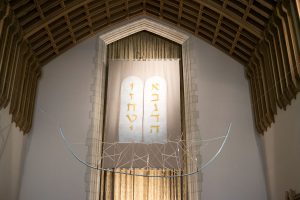Synagogue and church share one building

City Shul covers the cross in the Bloor Street United Church sanctuary with a tapestry depicting the Ten Commandments. AHMED-ZAKI HAGAR/GLEANER NEWS
By Ahmed-Zaki Hagar
Every Saturday morning at Bloor Street United Church (BSUC), a tapestry depicting the Ten Commandments is hung in front of the giant cross. It’s a sign that for the morning, the church has been transformed into a synagogue for the hundreds of Jewish congregants who observe Saturday services at the City Shul.
“We had to figure out a way to cover up the cross, which was quite large. We had to find a way to repaint our Jewish identity in a Christian space,” said Rabbi Elyse Goldstein, who founded the Reform synagogue in 2012 at the urging of former students from Kolel Adult Education Centre for Jewish Learning.
The synagogue’s first home was at the Wolfond Centre of Jewish Campus Life at the University of Toronto, but the congregation outgrew the space — which can hold only 60 people — in five years.
“The Wolfond Centre is a student centre, and we thought we were taking up too much of the students’ space,” Goldstein said. “We were using it so often that the students could not even use it. We felt that we had to give it back to them.”
That’s when the BSUC came in. City Shul had been holding its High Holiday services at Trinity-St. Paul’s United Church, but needed an alternative space in 2013, when Trinity-St. Paul’s was undergoing renovations.
“So [City Shul] came to us looking for short-term rental just for a couple of weekends in the fall,” said Reverend Martha ter Kuile of BSUC.
As the relationship grew over the years, ter Kuile said that representatives from the congregations met over several months to consider whether City Shul should make the move permanent.
“We talked to everyone at the church to see whether the adjustments that would need to be made could be made pretty readily,” said ter Kuile. “And everybody said ‘yes’ and everybody was quite enthusiastic.”
“Bloor Street United was very, very open and warm and interested in how they can accommodate us,” added Goldstein.
It’s not the first time that Bloor Street United has shared its space with another congregation. It was initially a Presbyterian congregation that voted to enter the United Church of Canada in 1924. The Alpha Korean United Church was a tenant of BSUC for 50 years until it moved to Willowdale last year, coinciding with City Shul’s relocation in September.
Mary-Louise Work, communications director for BSUC, described having City Shul under the same roof as a “very positive experience”.
“The day that they moved, the whole City Shul congregation marched up Huron Street and came into the building during one of our Sunday services,” she said. “It was one of the most joyous occasions.”
“Co-locating with a Christian church speaks to a certain intention that’s really powerful and important to us,” said a member of City Shul. “We care about pluralism, we care about living in the community. We care about being friends and good neighbours with people of other religious communities.
“We care about being Jewish in the world, as opposed to just being Jewish off by ourselves.”
Both congregations believe in inclusivity, diversity, and plurality. Ter Kuile said that “sincere worshippers should have a place of worship” when describing City Shul’s similarities with her congregation.
“When they put up their tapestry with the commandments on it, those are the same ten commandments that we have,” she said. “We were very open to it, and it has turned out to be working out really well.”
City Shul has moved in just as plans are being made to renovate the church, but Goldstein said that will not have an impact on the congregation. Both City Shul and Bloor Street United will simply move to another location until the construction is complete.
Rabbi Goldstein and Reverend ter Kuile will lead a shared Sabbath dinner at the end of the month with members of their respective congregations to learn from one another’s faith.
“We will explain our traditions through the evening,” she said. “There will be a study portion and discussion portion and just enjoying Sabbath dinner with each other.”
Goldstein believes that BSUC is a perfect match for City Shul. She and ter Kuile want to work together with the community to make the church open to all faiths for the foreseeable future.
“We are discussing with the church ways that physically the church can be more of a dual-purpose building,” Goldstein said. “I think the goal is for us and the church to stay together as a dual-purpose building.
“It is more than just ‘we are just another group renting the church.’ I think that we are in partnership with them to be a multi-faith building that the community can feel very welcome in no matter what faith they are.”
READ MORE:
NEWS: First look at Bloor Street United (Oct. 2017)
NEWS: New vision for Bloor Street United (July 2017)
